Introduction
Digital marketing is evolving rapidly, driven by the need for personalization, efficiency, and data-driven decision-making. Artificial Intelligence (AI) is at the forefront of this transformation, enabling marketers to automate tasks, gain deeper insights, and deliver more targeted campaigns. This guide explores how AI-driven use cases are revolutionizing digital marketing, turning it into a strategic advantage for businesses.
What is AI and Why Does It Matter in Digital Marketing?
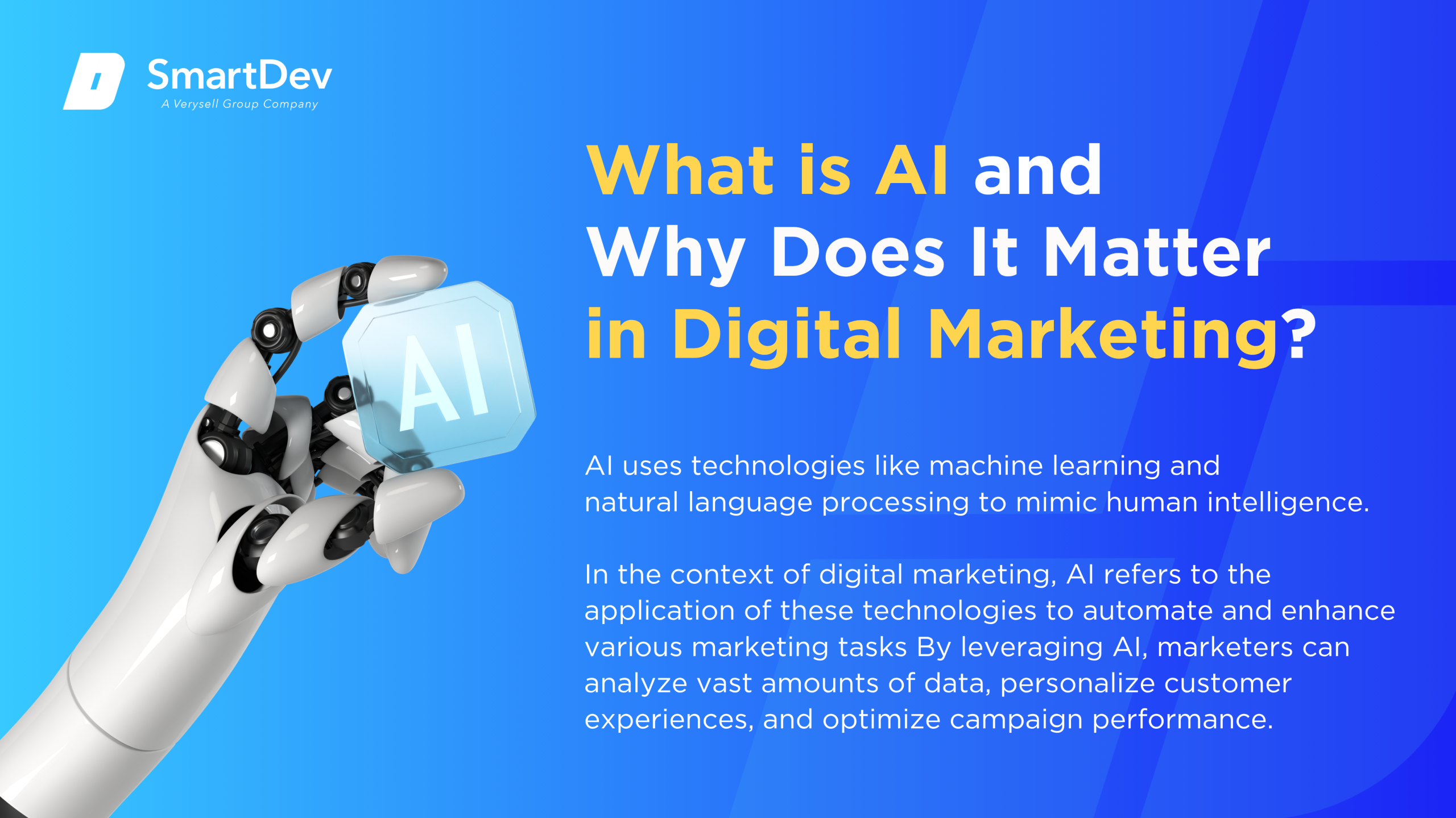
Definition of AI and Its Core Technologies
Artificial Intelligence (AI) encompasses computer systems designed to perform tasks that typically require human intelligence, such as learning, reasoning, problem-solving, and decision-making. According to IBM, AI includes technologies that enable machines to sense, comprehend, act, and learn with human-like intelligence.
In the context of digital marketing, AI refers to the application of these technologies to automate and enhance various marketing tasks. This includes machine learning for predictive analytics, natural language processing (NLP) for content creation, and computer vision for image recognition. By leveraging AI, marketers can analyze vast amounts of data, personalize customer experiences, and optimize campaign performance.
The Growing Role of AI in Transforming Digital Marketing
AI is reshaping digital marketing by enabling real-time data analysis and decision-making. Marketers can now segment audiences more precisely, predict customer behavior, and deliver personalized content across multiple channels.
The integration of AI into marketing strategies allows for more efficient budget allocation and improved ROI. For instance, AI-powered tools can optimize ad placements and bidding strategies in real-time, ensuring that marketing dollars are spent effectively.
Moreover, AI facilitates the creation of dynamic content that adapts to individual user preferences, enhancing engagement and conversion rates. This level of personalization was previously unattainable at scale, highlighting AI’s transformative impact on the industry.
Key Statistics and Trends Highlighting AI Adoption in Digital Marketing
AI adoption in digital marketing is accelerating. According to SurveyMonkey, 88% of marketers rely on AI in their current roles, with 93% using it to generate content faster and 90% for quicker decision-making.
The global AI marketing industry is projected to reach $107.5 billion by 2028, growing at a CAGR of 36.6% from $47.32 billion in 2025.
Additionally, McKinsey reports that 42% of organizations have adopted AI in their marketing and sales functions, underscoring its growing importance in driving business outcomes.
Business Benefits of AI in Digital Marketing
AI delivers powerful advantages that address core challenges in digital marketing. From streamlining content production to enhancing personalization and campaign performance, its impact is both measurable and strategic. Below are the key benefits AI offers to modern marketing teams.
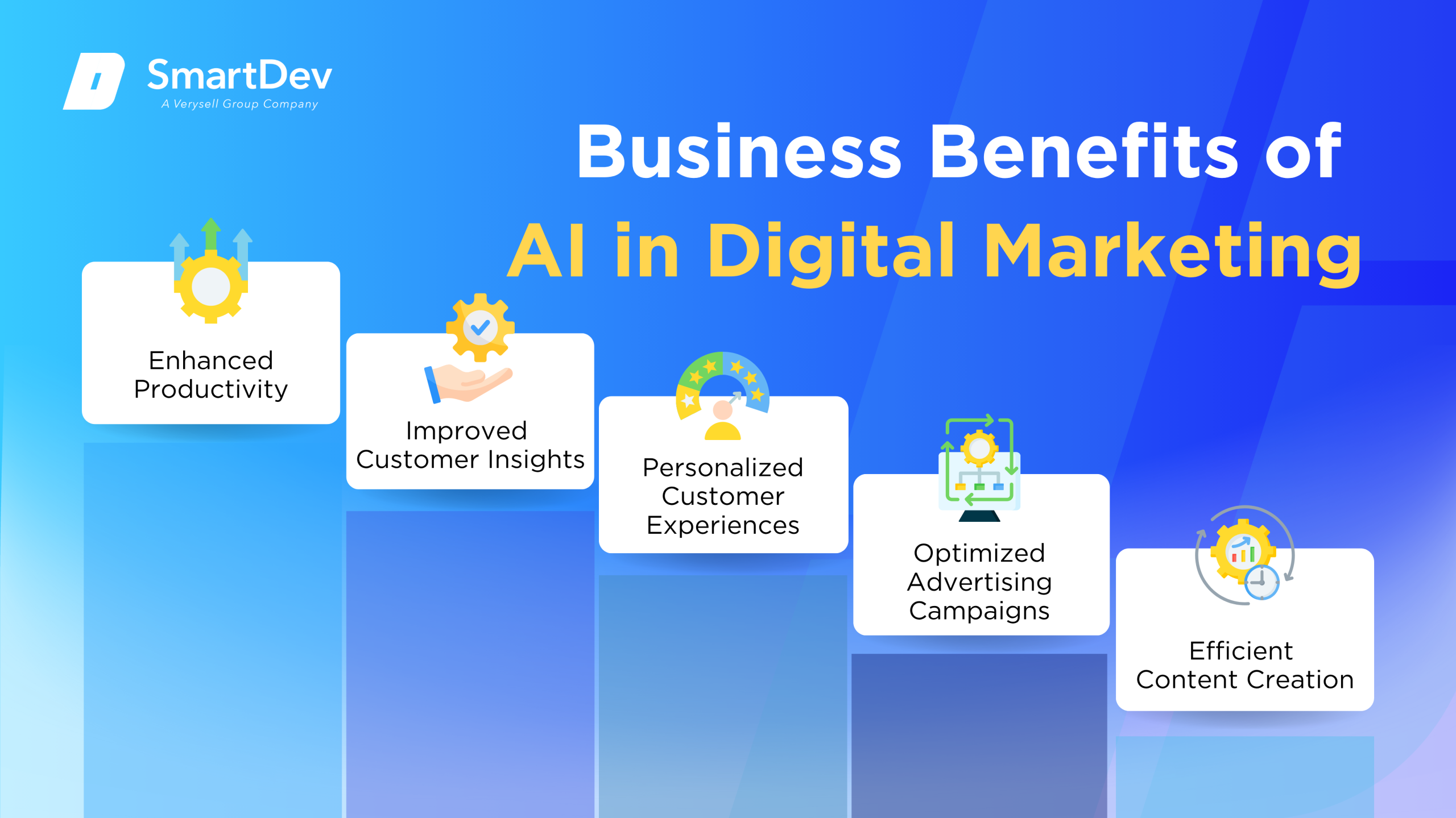
1. Enhanced Productivity
AI significantly boosts marketing productivity by automating repetitive tasks like A/B testing, analytics reporting, and campaign scheduling. This reduces manual workload and speeds up execution, allowing marketers to focus on creative and strategic priorities. With AI handling the operational load, teams can do more in less time, without compromising quality.
Tools powered by AI also surface optimization opportunities in real-time, minimizing the need for constant oversight. For instance, analytics platforms can identify underperforming assets and recommend changes instantly. This continuous feedback loop streamlines operations and keeps campaigns agile.
2. Improved Customer Insights
AI unlocks deeper customer insights by analyzing large, complex datasets faster than human teams can. It identifies patterns in behavior, preferences, and sentiment that inform sharper targeting and messaging. With these insights, marketing becomes more informed, precise, and effective.
Machine learning models also forecast future customer actions—like likelihood to convert or churn, allowing brands to act preemptively. This predictive capability supports smarter segmentation and prioritization. Ultimately, marketers make better decisions with less guesswork.
To dive deeper into how AI-powered analytics is reshaping marketing performance measurement, check out our guide on AI-driven marketing analytics.
3. Personalized Customer Experiences
AI allows marketers to deliver highly personalized experiences by dynamically adapting content, recommendations, and messaging to each user. This level of customization drives engagement, satisfaction, and long-term loyalty. As consumer expectations grow, personalization has become a competitive necessity.
From product suggestions to individualized emails and landing pages, AI makes personalization scalable. Recommendation engines, chatbots, and dynamic content platforms respond to user behavior in real time. These tools help brands connect with audiences on a 1:1 level—at enterprise scale.
4. Optimized Advertising Campaigns
AI enhances digital advertising by managing ad placements, audience targeting, and bid strategies in real time. This ensures every ad dollar is spent efficiently, reaching the right audience at the right time. As a result, brands see stronger ROI with less manual intervention.
Platforms like Google Performance Max or Meta’s Advantage+ use AI to continuously test creative, adjust spend, and optimize delivery. These systems self-improve with each campaign cycle. That means smarter, more cost-effective media strategies—with minimal human tuning required.
5. Efficient Content Creation
AI dramatically accelerates content creation, from blog posts and ad copy to social media captions and email templates. Natural Language Processing (NLP) tools can generate on-brand content aligned with campaign goals, saving time while maintaining quality. For busy marketing teams, this is a game-changer.
Beyond creation, AI tools help repurpose and optimize content across channels and formats. They suggest headlines, visuals, or formats based on what’s performing best. The result is more engaging content delivered faster, at a fraction of the traditional effort.
Challenges Facing AI Adoption in Digital Marketing
While AI promises to revolutionize digital marketing, its implementation is rarely straightforward. From data privacy constraints to integration complexity and skill gaps, several obstacles can hinder its success. Below are the critical challenges marketers must address to unlock AI’s full potential.
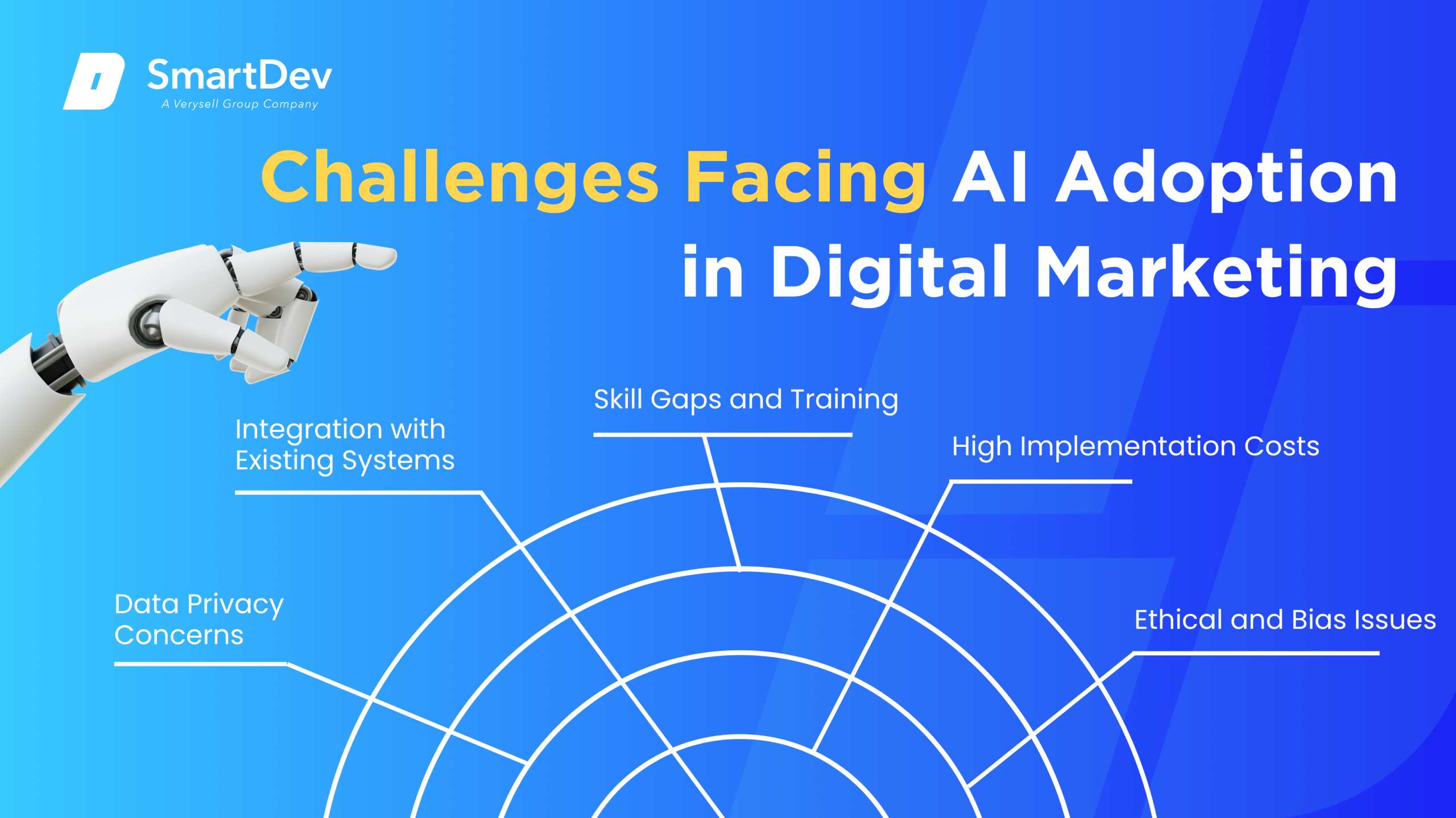
1. Data Privacy Concerns
AI relies heavily on consumer data, which raises serious concerns around privacy and compliance with regulations like GDPR and CCPA. Any misuse of personal data can lead to legal penalties and erode customer trust. Marketers must implement strong data governance and transparent policies to stay compliant.
Safeguarding customer data isn’t just a legal obligation—it’s a brand trust issue. Businesses need clear consent mechanisms, robust security infrastructure, and a culture of data responsibility. Without these, even well-meaning AI strategies can lead to backlash.
2. Integration with Existing Systems
Bringing AI into legacy marketing stacks is often complex, requiring custom integrations and infrastructure upgrades. Older platforms may lack the compatibility needed for AI to function properly, slowing down deployment. This creates technical bottlenecks that frustrate both marketers and IT teams.
Smooth integration demands upfront planning and strong cross-functional collaboration. Middleware solutions, APIs, and data lakes can help bridge the gap, but they require investment. Without a clear roadmap, AI efforts can stall before they deliver value.
3. Skill Gaps and Training
Many marketing teams lack the technical knowledge required to effectively deploy and manage AI tools. Understanding AI outputs, tuning algorithms, or interpreting predictive models takes a new kind of literacy. Without it, teams risk underutilizing, or misusing, the tools they adopt.
Closing this gap requires both hiring AI-fluent talent and investing in ongoing training for current staff. Collaboration with data science and engineering teams also becomes more critical. Only with the right skill set can AI become a reliable and scalable asset.
4. High Implementation Costs
AI can be expensive to implement, especially for small or mid-sized businesses. Costs include software, hardware, integration, and skilled talent, all before measurable returns are guaranteed. This financial barrier can delay adoption or limit AI to only well-funded teams.
To manage costs, businesses often start with modular, cloud-based AI solutions that offer flexibility and scale. These tools allow for incremental adoption and faster ROI validation. Still, careful planning is essential to avoid runaway expenses or underdelivered results.
5. Ethical and Bias Issues
AI systems can unintentionally amplify existing biases in training data, leading to unfair or discriminatory outcomes in targeting and messaging. This isn’t just a technical flaw—it’s a reputational risk. Left unchecked, biased AI can alienate users and damage brand credibility.
Ethical AI requires rigorous oversight during development and ongoing monitoring once deployed. Diverse data sets, transparency, and regular audits are essential safeguards. As public scrutiny grows, companies must treat fairness and accountability as core AI principles, not afterthoughts.
Specific Applications of AI in Digital Marketing
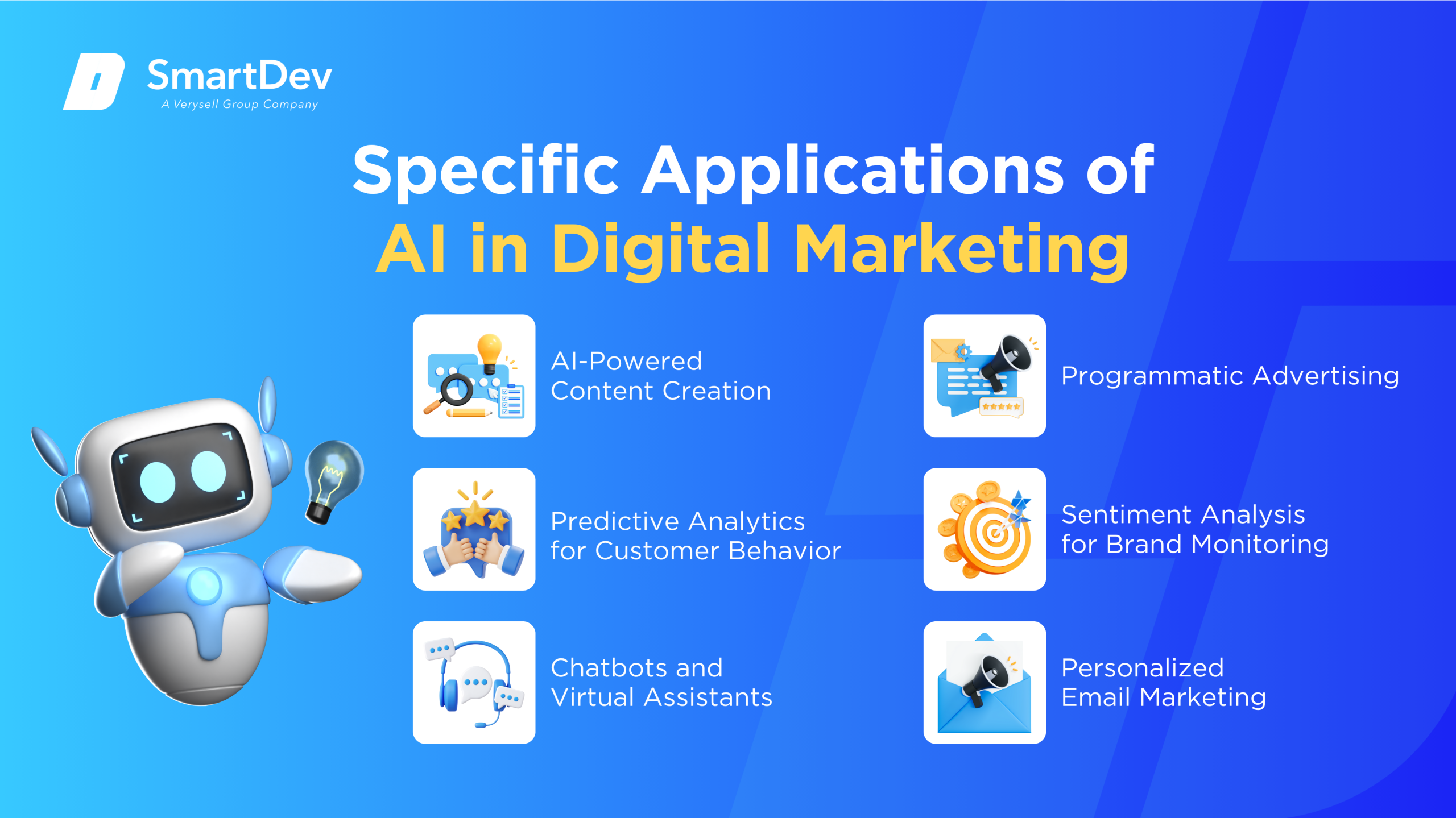
1. AI-Powered Content Creation
AI-powered content creation utilizes machine learning algorithms to generate written, visual, and audio content. This technology addresses the challenge of producing high-quality content at scale, ensuring consistency and relevance across various platforms.
These systems analyze vast datasets to understand language patterns, audience preferences, and trending topics. Tools like GPT-4 and Jasper AI can craft blog posts, social media updates, and product descriptions by processing input prompts and generating human-like text. Visual content generators, such as Midjourney, create images based on textual descriptions, enhancing visual storytelling.
The strategic value lies in efficiency and scalability. Marketers can produce diverse content rapidly, maintain brand voice consistency, and tailor messages to specific audience segments. However, ethical considerations include ensuring content originality and avoiding misinformation.
Real-World Example:
Coca-Cola launched the “Create Real Magic” platform, enabling users to generate artwork using AI tools like DALL-E 2 and ChatGPT. This initiative resulted in over 120,000 pieces of user-generated content, with visitors spending an average of 7+ minutes on the site. The campaign demonstrated how generative AI can foster deeper consumer engagement and personalized brand experiences.
2. Predictive Analytics for Customer Behavior
Predictive analytics employs AI to forecast customer behaviors, preferences, and purchasing patterns. This application addresses the need for proactive marketing strategies that anticipate customer needs.
By analyzing historical data, browsing habits, and transaction records, AI models identify trends and predict future actions. These insights inform personalized marketing campaigns, inventory management, and customer retention strategies.
The operational value includes improved targeting, reduced churn rates, and optimized resource allocation. However, challenges involve data privacy concerns and the need for high-quality data inputs.
Real-World Example:
Starbucks utilizes AI-driven predictive analytics to personalize customer experiences. By analyzing purchase history, time of visit, and location data, the Starbucks mobile app predicts customer preferences and sends tailored offers. This approach has significantly enhanced customer engagement and loyalty.
3. Chatbots and Virtual Assistants
AI-driven chatbots and virtual assistants enhance customer service by providing instant, 24/7 support. They address the demand for immediate responses and consistent customer interactions.
These systems use natural language processing (NLP) to understand and respond to customer inquiries. By integrating with CRM systems, they access customer data to provide personalized assistance, handle transactions, and resolve issues.
The strategic benefits include increased customer satisfaction, reduced operational costs, and the ability to handle high volumes of inquiries. Ethical considerations involve ensuring transparency and managing customer expectations regarding AI interactions.
Our guide on personalizing customer experience through AI-powered virtual assistants breaks down how businesses can leverage conversational AI to drive meaningful, 1:1 engagement at scale, while maintaining brand voice and service quality.
Real-World Example:
Sephora implemented an AI-powered virtual assistant to assist customers with product recommendations and beauty advice. This chatbot enhances the online shopping experience by providing personalized support, leading to increased customer satisfaction and sales.
4. Programmatic Advertising
Programmatic advertising leverages AI to automate the buying and placement of ads in real-time. This application addresses the inefficiencies of manual ad purchasing and targeting.
AI algorithms analyze user data to determine the most effective ad placements, bidding strategies, and audience segments. This real-time decision-making ensures ads reach the right audience at the optimal time.
The operational value includes enhanced targeting precision, cost-effectiveness, and improved ROI. However, concerns about data privacy and ad fraud necessitate robust monitoring and compliance measures.
Real-World Example:
Forever 21 utilized AI-generated campaigns to optimize their advertising efforts. By streamlining ad creation and targeting through AI, the fashion retailer achieved a 66% higher return on investment, demonstrating the effectiveness of AI in programmatic advertising.
5. Sentiment Analysis for Brand Monitoring
Sentiment analysis uses AI to assess public opinion about a brand, product, or service by analyzing online content. This application addresses the need for real-time brand reputation management.
AI models process data from social media, reviews, and forums to gauge customer sentiments. By identifying positive, negative, or neutral tones, businesses can respond promptly to feedback and adjust strategies accordingly.
The strategic value lies in proactive reputation management, customer engagement, and product development insights. Challenges include accurately interpreting context and sarcasm in textual data.
Real-World Example:
Hootsuite employs AI tools to monitor customer sentiment across social media platforms. By analyzing user-generated content, Hootsuite gains insights into public perception, allowing for timely responses and strategy adjustments to maintain a positive brand image.
6. Personalized Email Marketing
AI enhances email marketing by personalizing content, send times, and frequency based on user behavior. This application addresses the challenge of engaging customers effectively through email campaigns.
By analyzing user interactions, purchase history, and preferences, AI tailors email content to individual recipients. Predictive models determine optimal send times and subject lines to maximize open rates and conversions.
The operational benefits include higher engagement, improved customer retention, and increased sales. Ethical considerations involve respecting user privacy and avoiding over-personalization that may seem intrusive.
Real-World Example:
Yum Brands, the parent company of Taco Bell and KFC, implemented AI-driven personalized email campaigns. By considering factors like time and day, these campaigns achieved better engagement and tailored offers for customers, leading to increased purchases and reduced customer churn.
Examples of AI in Digital Marketing
Real-World Case Studies
AI is no longer just a futuristic concept in digital marketing, it’s being actively deployed by global brands to transform how they engage with consumers. These real-world case studies show how AI enhances personalization, boosts campaign efficiency, and delivers significant business outcomes.
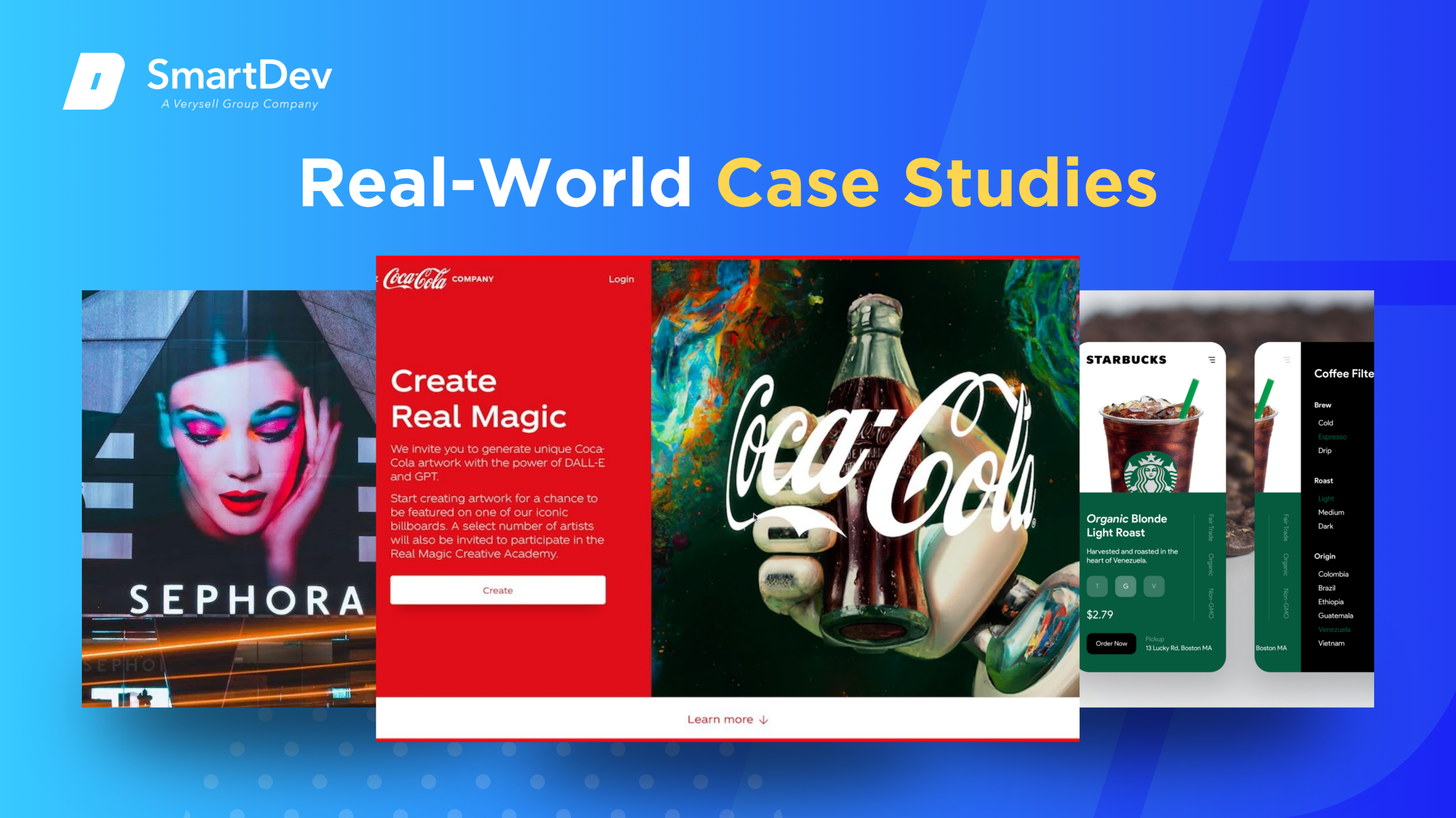
1. Coca-Cola: Personalizing Global Campaigns with AI
Coca-Cola has embraced AI to personalize its marketing campaigns and enhance consumer engagement. During the FIFA World Cup, the company utilized AI tools to generate over 120,000 unique videos, incorporating consumers’ names and photos into Coca-Cola branding, which were then shared across digital platforms. This approach not only increased consumer interaction but also amplified the brand’s visibility during a major global event.
In another initiative, Coca-Cola launched the “Create Real Magic” platform, allowing users to generate personalized digital greeting cards by reimagining iconic Coca-Cola images through AI tools. This campaign linked the brand’s rich heritage with its optimistic vision of the future, fostering deeper consumer engagement and personalized brand experiences.
2. Starbucks: Enhancing Customer Experience through AI
Starbucks has implemented AI to revolutionize its customer experience, focusing on personalization and efficiency. The company developed “Deep Brew,” an AI engine that analyzes customer data to provide personalized product recommendations and optimize store operations. This initiative has enabled Starbucks to deliver tailored experiences, increasing customer satisfaction and loyalty.
Additionally, Starbucks has integrated AI into its mobile app to streamline the ordering process. The app uses machine learning algorithms to suggest orders based on previous purchases and preferences, making the ordering experience more convenient and personalized for users. This use of AI has significantly improved the efficiency of service and enhanced the overall customer experience.
3. Sephora: Innovating Beauty Retail with AI
Sephora has leveraged AI to transform the beauty retail experience, focusing on personalization and customer engagement. The company introduced the “Virtual Artist” tool, which uses AI and augmented reality to allow customers to virtually try on makeup products. This technology has helped customers make more informed purchasing decisions, reducing product returns and increasing customer satisfaction.
Furthermore, Sephora has utilized AI to enhance its loyalty programs by analyzing customer data to provide personalized product recommendations and promotions. This approach has strengthened customer relationships and improved operational efficiency. By integrating AI into various aspects of its operations, Sephora has set a new standard for personalized beauty retail experiences.
Innovative AI Solutions
Emerging AI technologies are continually reshaping digital marketing strategies. Innovations such as generative AI, advanced analytics, and machine learning models are enabling more personalized and efficient marketing approaches.
These solutions facilitate real-time data analysis, predictive modeling, and automated content generation, allowing marketers to respond swiftly to market changes and customer needs. By leveraging these technologies, businesses can create more engaging and targeted campaigns.
The ongoing evolution of AI in digital marketing promises even greater advancements, including enhanced customer experiences, improved ROI, and the ability to anticipate market trends. Staying abreast of these innovations is crucial for businesses aiming to maintain a competitive edge in the digital landscape.
AI-Driven Innovations Transforming Digital Marketing
Emerging Technologies in AI for Digital Marketing
Artificial Intelligence (AI) is revolutionizing digital marketing by introducing advanced technologies that enhance efficiency and personalization. Generative AI, for instance, is transforming content creation. Tools like ChatGPT and Midjourney enable marketers to produce high-quality copy, images, and videos rapidly, reducing production time and costs.
Computer vision is another AI technology making significant strides in digital marketing. It allows for the analysis of visual data, enabling features like virtual try-ons and image recognition. Sephora’s Virtual Artist app utilizes computer vision to let customers virtually try on makeup, enhancing user engagement and driving sales.
AI’s Role in Sustainability Efforts
AI contributes to sustainability in digital marketing by optimizing resource utilization and reducing waste. Predictive analytics, powered by AI, helps marketers forecast demand and customer behavior, leading to more efficient inventory management and targeted campaigns. This reduces overproduction and minimizes environmental impact.
Moreover, AI-driven smart systems can optimize energy consumption in digital marketing operations. By analyzing data on energy usage patterns, AI can suggest adjustments to reduce energy consumption, contributing to environmental sustainability.
How to Implement AI in Digital Marketing
Implementing AI in digital marketing starts with a clear vision and a focus on where it can create the most impact—from content creation to customer insights. This guide walks you through the essential steps to ensure a smooth, strategic integration.
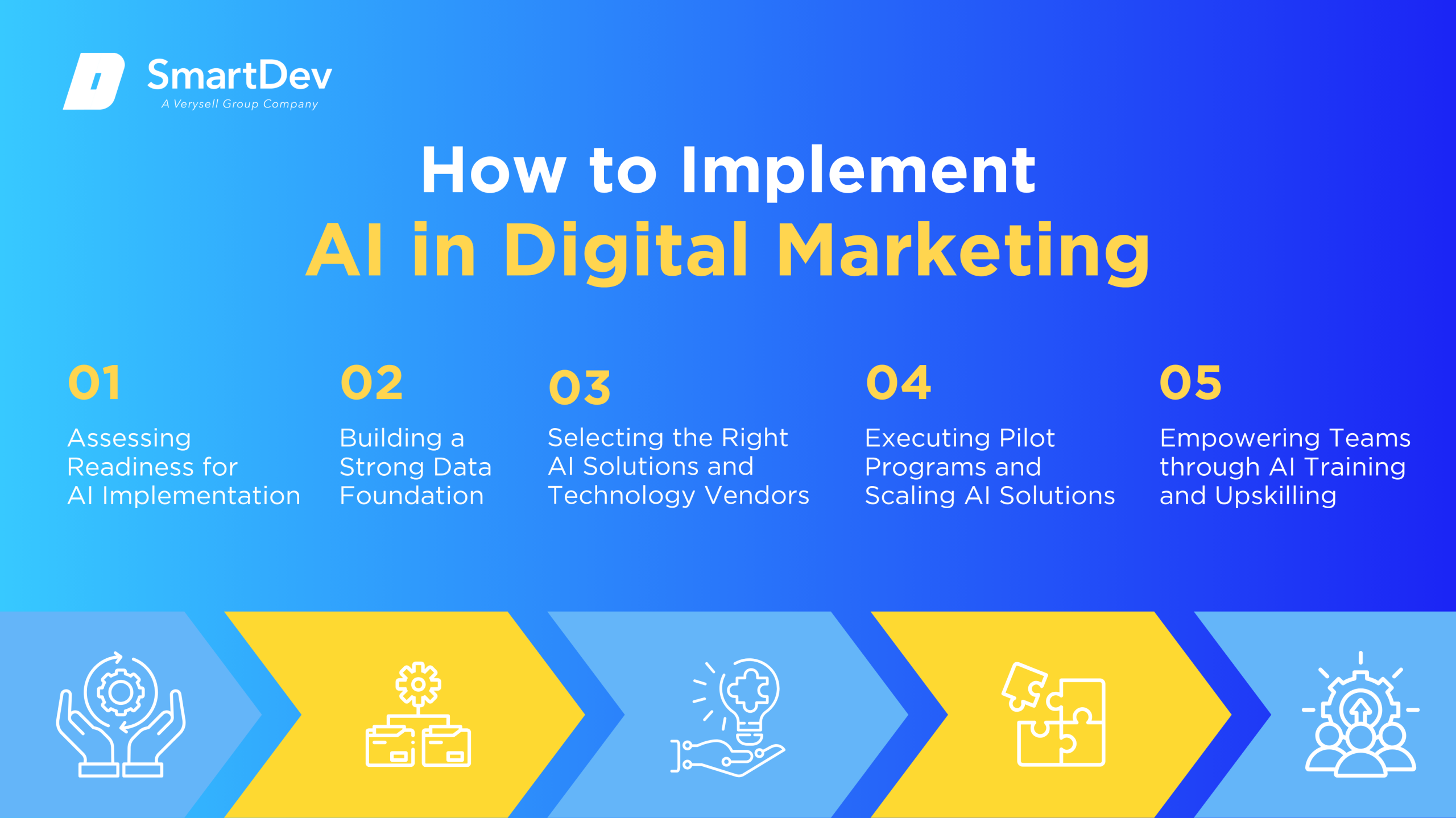
Step 1. Assessing Readiness for AI Adoption
Before integrating AI into your digital marketing strategy, it’s crucial to assess your organization’s readiness. Identify areas where AI can add value, such as customer segmentation, content creation, or campaign optimization. Evaluate your current processes and determine where AI can enhance efficiency and effectiveness.
Consider the technological infrastructure required for AI implementation. Ensure your organization has the necessary hardware, software, and data management systems to support AI tools. Additionally, assess the skills and expertise of your team to determine if training or hiring is needed to manage AI technologies effectively.
Step 2. Building a Strong Data Foundation
A robust data foundation is essential for successful AI integration. Begin by collecting high-quality, relevant data from various sources, including customer interactions, website analytics, and social media platforms. Ensure data is accurate, consistent, and up-to-date to enable effective AI analysis.
Implement data cleaning and management best practices to maintain data integrity. This includes removing duplicate entries, correcting errors, and standardizing data formats. Proper data governance ensures that AI tools can process and analyze data efficiently, leading to more accurate insights and better decision-making.
Step 3. Choosing the Right Tools and Vendors
Selecting the appropriate AI tools and vendors is critical for successful implementation. Evaluate AI platforms based on their capabilities, scalability, and compatibility with your existing systems. Consider tools that offer features like predictive analytics, content generation, and customer segmentation tailored to digital marketing needs.
When choosing vendors, assess their expertise, support services, and track record in the industry. Look for vendors who provide comprehensive training and ongoing support to ensure smooth integration and operation of AI tools. Collaborating with reputable vendors can enhance the effectiveness of your AI-driven marketing strategies.
Choosing the right AI tools also means understanding which model type fits your marketing goals. Dive into our guide on AI model types to select tools built on models that deliver the outcomes you need.
Step 4. Pilot Testing and Scaling Up
Before full-scale implementation, conduct pilot tests to evaluate the performance of AI tools in your marketing processes. Start with small-scale projects to assess the impact on efficiency, customer engagement, and ROI. Use the insights gained to refine your AI strategies and address any challenges encountered.
Once pilot tests demonstrate positive results, gradually scale up AI integration across your marketing operations. Monitor performance metrics continuously to ensure AI tools are delivering the desired outcomes. Scaling up should be a strategic process, allowing for adjustments and improvements along the way.
Step 5. Training Teams for Successful Implementation
Equipping your team with the necessary skills to work alongside AI technologies is vital. Provide training programs that cover the functionalities of AI tools, data analysis techniques, and ethical considerations in AI usage. Empowering your team with knowledge ensures they can effectively leverage AI to enhance marketing efforts.
Encourage a culture of continuous learning and adaptability. As AI technologies evolve, ongoing training and development will help your team stay updated with the latest advancements. Fostering a collaborative environment where human creativity complements AI capabilities leads to more innovative and effective marketing strategies.
Measuring the ROI of AI in Digital Marketing
Key Metrics to Track Success
Evaluating the return on investment (ROI) of AI in digital marketing involves tracking specific metrics that reflect performance improvements. Productivity enhancements can be measured by the reduction in time spent on tasks like content creation and data analysis.
Cost savings achieved through automation are another critical metric. AI tools can reduce expenses by automating repetitive tasks, optimizing ad spend, and improving targeting accuracy. Monitoring these savings provides insight into the financial benefits of AI integration.
Case Studies Demonstrating ROI
Real-world examples illustrate the tangible benefits of AI in digital marketing. Headway, an edtech startup, leveraged AI tools like Midjourney and HeyGen to enhance ad performance, resulting in a 40% increase in ROI for video ads. The use of AI also reduced production costs and allowed for more innovative content creation.
Similarly, Delta Air Lines utilized AI-driven analytics to attribute $30 million in sales to its Olympic sponsorship, demonstrating the power of AI in connecting advertising efforts to sales outcomes.
Common Pitfalls and How to Avoid Them
While AI offers significant advantages, there are potential pitfalls to be aware of. One common issue is over-reliance on AI without human oversight, which can lead to errors or misinterpretations. To mitigate this, maintain a balance between AI automation and human judgment in decision-making processes.
Another challenge is data privacy concerns. Ensure compliance with data protection regulations and implement robust security measures to safeguard customer information. Transparency in data usage builds trust with consumers and enhances the effectiveness of AI-driven marketing strategies.
Future Trends of AI in Digital Marketing
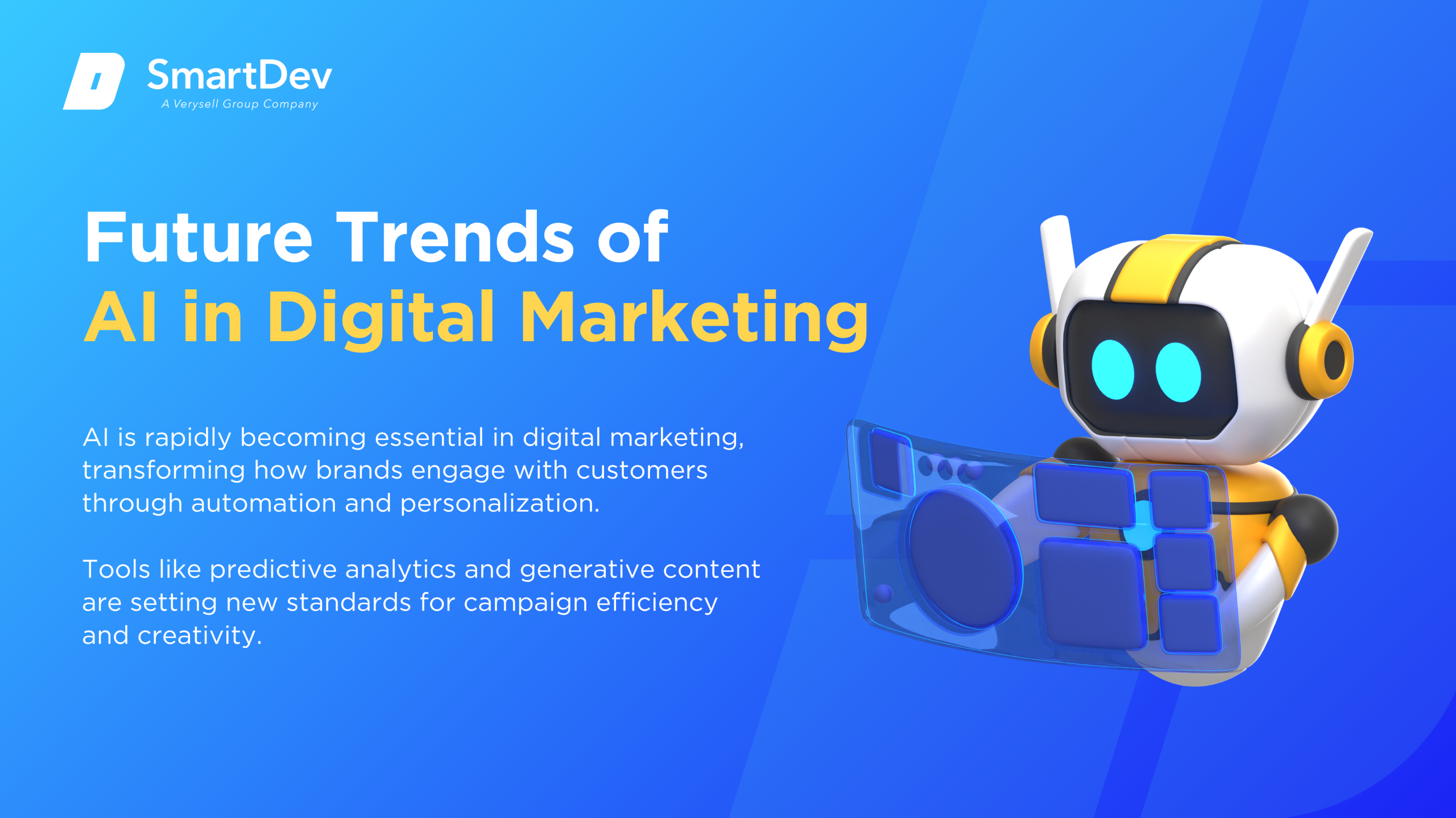
Predictions for the Next Decade
Looking ahead, AI is expected to become increasingly integrated into all aspects of digital marketing. Predictive analytics will evolve to provide even more accurate forecasts of customer behavior, enabling hyper-personalized marketing strategies. AI-driven content creation will become more sophisticated, producing high-quality, tailored content at scale.
Voice search and AI-powered chatbots will play a more prominent role in customer interactions, providing instant, personalized responses. Additionally, AI will facilitate more immersive experiences through augmented and virtual reality, transforming how brands engage with consumers.
How Businesses Can Stay Ahead of the Curve
To remain competitive, businesses must proactively embrace AI technologies. This involves continuous investment in AI tools, ongoing training for marketing teams, and staying informed about emerging trends. Collaborating with AI experts and participating in industry forums can provide valuable insights and foster innovation.
Moreover, businesses should prioritize ethical considerations in AI usage, ensuring transparency and fairness in automated decision-making processes. By aligning AI strategies with customer needs and values, companies can build stronger relationships and drive long-term success.
To stay ahead of accelerating AI innovation, businesses must align their long-term strategy with tech evolution. Our article on AI-driven business strategies offers a roadmap to future-proof growth through smarter AI adoption.
Conclusion
Key Takeaways
AI is transforming digital marketing by enhancing efficiency, personalization, and ROI. From generative content creation to predictive analytics, AI tools enable marketers to deliver more targeted and effective campaigns. Real-world case studies demonstrate significant improvements in performance and cost savings, highlighting the value of AI integration.
Moving Forward: A Path to Progress
As AI continues to revolutionize digital marketing, businesses have a powerful opportunity to enhance campaign performance, personalize customer experiences, and maximize ROI. From automating ad creatives to analyzing complex customer data, AI empowers marketing teams to focus on strategy and innovation rather than repetitive tasks.
At SmartDev, we specialize in building custom AI-driven marketing solutions that drive measurable results. Whether you’re looking to optimize your media spend with predictive analytics, generate high-converting content at scale, or personalize user journeys in real time, we collaborate with your team to ensure seamless integration and impactful outcomes.
Contact us today to explore how AI can elevate your marketing performance, improve customer engagement, and future-proof your brand in a fast-changing digital landscape.
Let’s partner to build a smarter, data-driven marketing engine that delivers results.
—
References:
- The state of AI: How organizations are rewiring to capture value | McKinsey & Company
- The Role Of AI In Digital Marketing: What You Need To Know | Forbes
- 28 AI marketing statistics you need to know in 2025 | SurveyMonkey
- Case Studies on Successful AI-Driven Marketing Campaigns | Markopolo.ai
- 10 ways Coca-Cola is using AI – Case Study [2025] | DigitalDefynd
- Coca‑Cola Harnesses Power of AI to Deliver Holiday Magic | The Coca-Cola Company
- Case Study: Sephora’s Use of AI to Deliver Personalized Beauty Experiences | Redress Compliance
- AI in Digital Marketing – The Ultimate Guide | Digital Marketing Institute
- AI Will Shape the Future of Marketing | Harvard University
- Case Studies: Success Stories of AI Integration in Digital Marketing | Krotov Studio
- How to Design an AI Marketing Strategy | Harvard Business Review
- How AI-Driven Data Analytics Can Enhance Business Decisions In Digital Marketing | Forbes
- The Age of the Machines: How AI is Personalizing Digital Marketing and Boosting ROI | Medium







